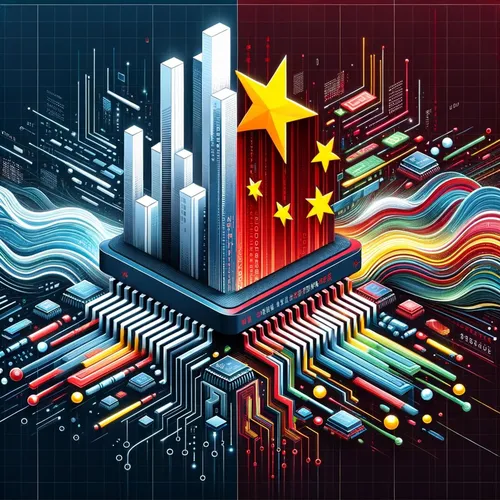Silicon Smackdown: Nvidia's China Chip Tango Meets Murky Panda's Zero-Day Party!
- Author
- Quiet. Please
- Published
- Sun 24 Aug 2025
- Episode Link
- https://www.spreaker.com/episode/silicon-smackdown-nvidia-s-china-chip-tango-meets-murky-panda-s-zero-day-party--67497634
This is your Beijing Bytes: US-China Tech War Updates podcast.
Welcome back, listeners, to another download of Beijing Bytes: US-China Tech War Updates. I’m Ting—your favorite cyber-sleuth with a soft spot for semiconductors and sarcasm. Let’s plug in: the rivalry has network congestion and the packets are flying!
The last two weeks in tech warfare? Whew. Even by US-China standards it’s been a bonanza of bans, cyber-scuffles, and policy whiplash. Let’s start with the silicon soap opera: Nvidia, led by Jensen Huang, is once again dancing on the razor edge between profit and protectionism. After screaming headlines earlier this summer over US chip export bans, Nvidia rolled out the H20—a watered-down AI chip, designed specifically to skate under US restrictions and keep the yuan rolling in. But not so fast! US Commerce Secretary Howard Lutnick went on air and basically said, Listen, China’s not even getting the “third best stuff," it's all about American supremacy and tech addiction. Cue the regulatory thunder: Beijing took offense, ordered its tech darlings to scale back Nvidia orders, and doubled down on pushing homegrown chip champions. Expect more “Made in China” chips baked fresh by SMIC and Huawei, with DeepSeek AI leading the charge in efficient, proprietary silicon. All this as Nvidia and AMD make a once-unthinkable deal: a 15% revenue kickback to Uncle Sam from Chinese chip sales just to get export licenses, setting a wild new precedent in how Washington monetizes tech diplomacy.
Swinging to cyber, it’s been a pressure cooker. The China-linked Silk Typhoon APT group—also known as Murky Panda—is ramping up zero-day and n-day exploit attacks across North America, with CrowdStrike and others warning of their incredible targeting scope. Meanwhile, in the courts, a Chinese developer named David Lu was slapped with a four-year US jail sentence for a sabotage stunt at Eaton Corporation—think malicious code, delayed server deaths, and a “kill switch” for intranet carnage. The cyber battlefield is as asymmetric and personal as ever.
On the policy front, the US is nuking the beloved de minimis exemption for imports under $800. That’s effective in just a few days and will hammer e-commerce platforms like Shein, Temu, and even Amazon, who now face higher compliance costs and full customs scrutiny. China and Hong Kong got a head start on these restrictions back in May, so now trade pain is bilateral—and legal showdowns over executive authority could drag this fight into 2027.
Perhaps the most strategic move: China’s unveiling of DeepSeek AI, open-sourcing a powerful GPT-5 rival built natively for local chips and priced to undercut OpenAI globally. That resets the deck in both AI and crypto, since DeepSeek’s proprietary silicon is already nudging crypto-mining operations toward China, threatening Western control of blockchain infrastructure. Crypto and AI cold wars—yep, it’s now a thing.
So what do the experts say? In a nutshell: tech is now treated as statecraft, not just commerce. The US is getting more interventionist, demanding a cut of the action. China’s pivoting faster to self-reliance, shepherding domestic winners and ring-fencing data flows, even as it faces compliance headaches from those same protective moves. Investors are hedging and innovators are speedrunning the decoupling marathon.
Forecast? Tensions will escalate. More fragmentation, twin technology ecosystems, and a constant tug-of-war between control and progress—think Cold War with faster Wi-Fi and more zero days.
Thanks for tuning in to Beijing Bytes! Don’t forget to subscribe for your weekly jolt of witty, wired intelligence. This has been a quiet please production, for more check out quiet please dot ai.
For more http://www.quietplease.ai
Get the best deals
